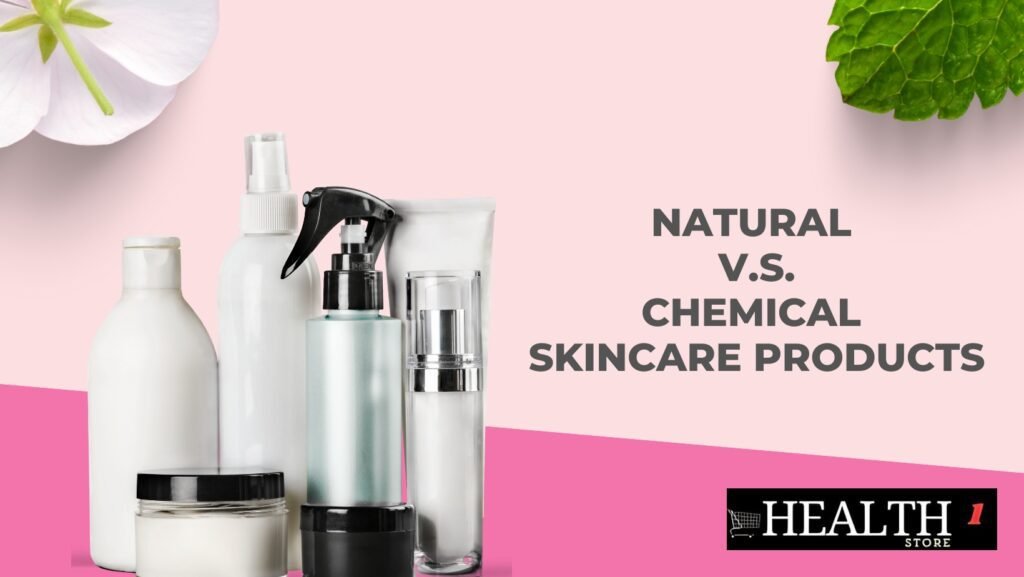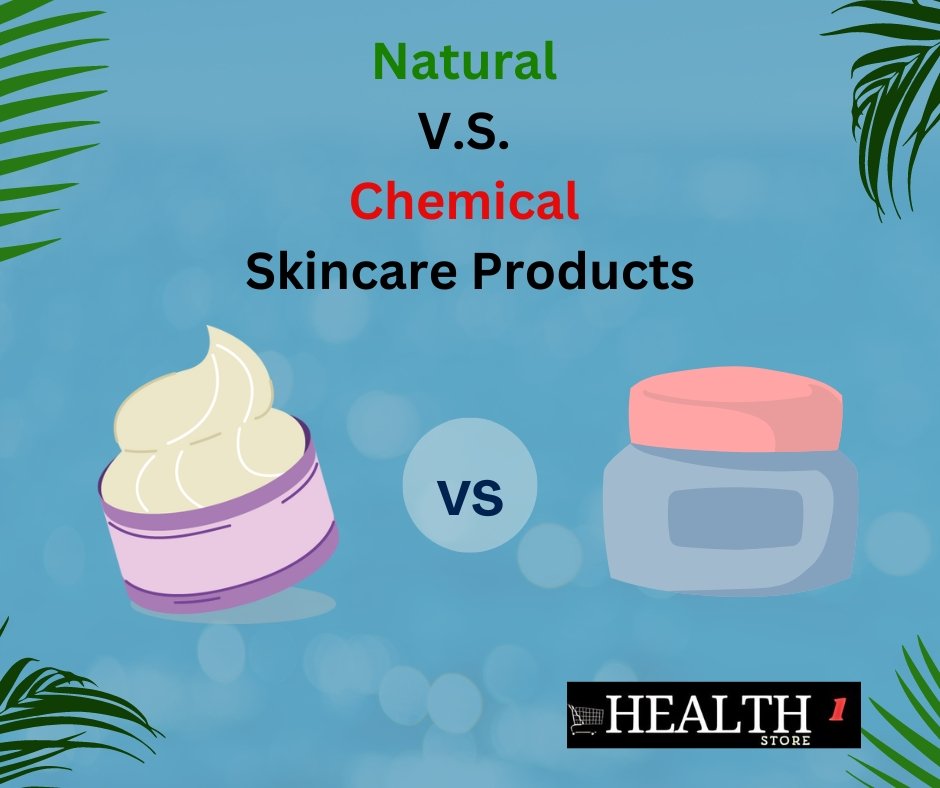Introduction of Natural and Chemical Skincare
Natural and chemical skincare products are both available in the market. And, the skincare industry has seen a growing divide between natural and chemical products. With increasing consumer awareness and the rise of clean beauty, more people are questioning what exactly they’re putting on their skin. Both natural and chemical skincare products have their proponents, but the choice between the two isn’t always clear-cut. This article will explore the differences between natural and chemical skincare products, including their definitions, benefits, drawbacks, and how to choose the right products for your skin type and concerns.
Table of Contents

Defining Natural and Chemical Skincare
Natural Skincare Products:
- Ingredients: Natural skincare products are formulated with ingredients derived from plants, minerals, and other naturally occurring substances. These products often contain essential oils, herbal extracts, and other botanicals.
- Examples: Aloe vera gel, coconut oil, shea butter, rosehip oil, and green tea extract.
Chemical Skincare Products:
- Ingredients: Chemical skincare products contain synthetic ingredients, which are often developed in labs. These can include preservatives, fragrances, colorants, and active ingredients like retinoids and hyaluronic acid.
- Examples: Benzoyl peroxide, parabens, synthetic fragrances, and silicone-based products.
| Type of Product | Ingredients Sources | Examples |
|---|---|---|
| Natural | Plant-based, minerals, natural substances | Aloe vera, coconut oil, shea butter, green tea extract |
| Chemical | Synthetic, lab-developed | Benzoyl peroxide, parabens, retinoids, hyaluronic acid |
Benefits of Natural Skincare Products
- Fewer Irritants:
- Natural products are often free from synthetic chemicals, making them less likely to irritate sensitive skin. Many natural ingredients have anti-inflammatory properties, which can soothe irritated skin.
- Eco-Friendly:
- Natural products are generally more environmentally friendly. They are often produced sustainably and packaged in recyclable materials. Many brands also avoid using harmful chemicals that could affect ecosystems.
- Holistic Approach:
- Natural skincare often aligns with a holistic lifestyle, focusing on overall health and wellness. Ingredients like essential oils can have aromatherapeutic benefits, promoting relaxation and mental well-being.
- No Synthetic Fragrances:
- Natural products typically don’t contain synthetic fragrances, which can cause allergic reactions or irritate the skin. Instead, they rely on natural scents from essential oils.
Drawbacks of Natural Skincare Products
- Limited Shelf Life:
- Without synthetic preservatives, natural products may have a shorter shelf life. This can lead to a higher risk of product spoilage and reduced effectiveness over time.
- Potential Allergens:
- While natural ingredients are less likely to cause irritation, they can still trigger allergies. For example, some people may react to essential oils or nut-based ingredients.
- Variability in Effectiveness:
- The potency of natural ingredients can vary depending on factors like the source, harvest time, and processing methods. This variability can lead to inconsistent results.
- Cost:
- Natural products are often more expensive due to the higher cost of sourcing and processing organic or sustainably harvested ingredients.
| Benefits of Natural Products | Drawbacks of Natural Products |
|---|---|
| Fewer irritants | Limited shelf life |
| Eco-friendly | Potential allergens |
| Holistic approach | Variability in effectiveness |
| No synthetic fragrances | Cost |
Benefits of Chemical Skincare Products
- Scientifically Proven Ingredients:
- Many chemical skincare products contain active ingredients that have been scientifically tested and proven to address specific skin concerns. For instance, retinoids are well-known for their effectiveness in reducing wrinkles and fine lines.
- Longer Shelf Life:
- Chemical preservatives extend the shelf life of products, reducing the risk of bacterial growth and ensuring the product remains effective for longer periods.
- Targeted Treatment:
- Chemical skincare products are often formulated to target specific skin issues, such as acne, hyperpigmentation, or aging. Ingredients like salicylic acid and benzoyl peroxide are particularly effective for treating acne.
- Consistency in Results:
- The standardized production process of chemical products ensures consistency in potency and effectiveness, providing reliable results with regular use.
Drawbacks of Chemical Skincare Products
- Potential Irritants:
- Chemical products may contain harsh ingredients like sulfates, parabens, and synthetic fragrances, which can irritate the skin or cause allergic reactions, especially in those with sensitive skin.
- Environmental Concerns:
- The production and disposal of chemical products can contribute to environmental pollution. Some chemicals may not biodegrade easily, leading to long-term environmental impact.
- Skin Sensitivity:
- Prolonged use of some chemical ingredients, such as retinoids or alpha hydroxy acids (AHAs), can increase skin sensitivity, making it more susceptible to sunburn and irritation.
- Unknown Long-Term Effects:
- While many chemical ingredients are effective, their long-term effects on skin health are not always fully understood. Some ingredients, such as parabens, have raised concerns about potential links to health issues like hormone disruption.
| Benefits of Chemical Products | Drawbacks of Chemical Products |
|---|---|
| Scientifically proven ingredients | Potential irritants |
| Longer shelf life | Environmental concerns |
| Targeted treatment | Skin sensitivity |
| Consistency in results | Unknown long-term effects |
Statistics on Natural and Chemical Skincare
The skincare market is diverse, and consumer preferences vary based on a range of factors, including skin type, concerns, and lifestyle. Recent statistics highlight these trends:
- Market Growth: The global skincare market was valued at approximately $136.3 billion in 2022 and is expected to reach $200 billion by 2026, driven by growing consumer awareness and demand for effective skincare solutions.
- Natural and Chemical skincare Preference: A 2021 survey revealed that 42% of consumers prefer natural skincare products, citing concerns about synthetic chemicals. However, 35% of respondents indicated a preference for chemical products due to their proven effectiveness.
- Allergy Reports: According to the American Academy of Dermatology, up to 15% of people with sensitive skin report adverse reactions to chemical ingredients, compared to 7% for natural ingredients.
How to Choose Between Natural and Chemical Skincare Products
Choosing between natural and chemical skincare products depends on your skin type, concerns, and personal preferences. Here are some tips to guide your decision:
- Identify Your Skin Type:
- Oily, dry, combination, and sensitive skin types may respond differently to natural and chemical ingredients. For example, oily skin may benefit from chemical exfoliants like salicylic acid, while sensitive skin might prefer soothing natural ingredients like chamomile.
- Consider Your Skin Concerns:
- Specific concerns such as acne, aging, or hyperpigmentation may require targeted treatments. Chemical products may offer faster and more reliable results for severe conditions, while natural products can be beneficial for maintenance and overall skin health.
- Check for allergens:
- Always review the ingredient list for potential allergens, whether natural or synthetic. Perform a patch test before using a new product to ensure it’s safe for your skin.
- Evaluate Environmental Impact:
- If sustainability is important to you, consider the environmental impact of your skincare products. Natural products tend to have a lower environmental footprint, but not always—look for certifications like organic or cruelty-free.
- Balance Your Routine:
- It’s possible to combine both natural and chemical products in your skincare routine. For instance, you can use a natural cleanser and moisturizer alongside a chemical-based treatment serum for specific concerns.
Conclusion of Natural and Chemical Skincare
The debate between natural and chemical skincare products ultimately comes down to personal preference and individual skin needs. Natural products offer a holistic and eco-friendly approach to skincare but may come with limitations like shorter shelf life and potential allergens. On the other hand, chemical products are often backed by scientific research and provide consistent, targeted results, though they can carry risks such as irritation and environmental concerns.
By understanding the differences between natural and chemical skincare products, you can make informed choices that align with your skin’s unique requirements and your values. Whether you opt for natural and chemical skincare products or one of them, the key is to use products that work harmoniously with your skin, ensuring it remains healthy, radiant, and resilient.




